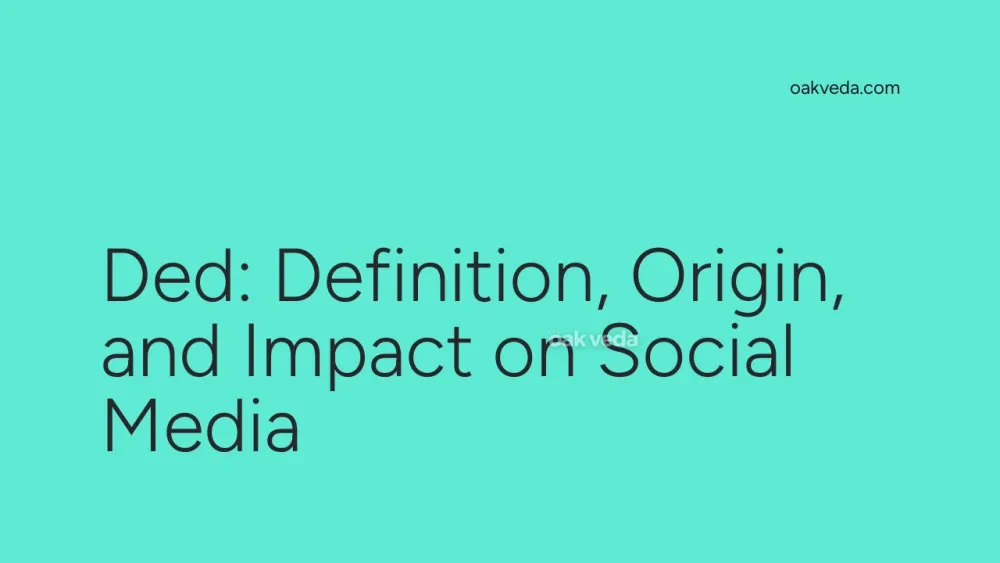
What is "Ded"?
"Ded" is a popular internet slang term that has gained significant traction in social media and online communications. It's an intentional misspelling of the word "dead" and is used to express extreme exhaustion, amusement, or to indicate that something is no longer functional or relevant. This informal term has become a staple in digital conversations, particularly among younger internet users.
Origin and Development of "Ded"
The origin of "ded" can be traced back to the early days of internet chat rooms and text messaging. As users sought ways to type quickly and expressively, intentional misspellings became a form of digital shorthand. "Ded" emerged as a playful variation of "dead," likely popularized by its ease of typing and its ability to convey a more exaggerated or humorous tone than its correctly spelled counterpart.
Over time, "ded" has evolved from a simple typo to a deliberate expression, gaining widespread usage across various social media platforms and online communities.
How "Ded" Works in Online Communication
In online conversations, "ded" serves multiple purposes:
- Expressing extreme fatigue: Users might say "I'm ded" after a long day or challenging task.
- Indicating laughter: Similar to "LOL" or "ROFL," "ded" can signify that something is so funny it has figuratively killed the user.
- Describing non-functional items: "My phone is ded" could mean the battery is depleted or the device isn't working.
- Declaring something outdated or irrelevant: A trend or meme might be called "ded" when it's no longer popular.
The term's versatility and informal nature make it a go-to expression for many social media users looking to add emphasis or humor to their messages.
Popular Examples of "Ded" Usage
To better understand how "ded" is used in real-world scenarios, consider these examples:
- "That meme has me ded 💀😂" (Expressing extreme amusement)
- "After that workout, I'm ded" (Indicating exhaustion)
- "My social life is ded thanks to this project" (Describing something as non-existent or severely impacted)
- "That trend is so ded" (Declaring something as outdated or irrelevant)
Impact of "Ded" on Social Media Culture
The widespread adoption of "ded" reflects broader trends in online communication:
- Linguistic evolution: It showcases how language adapts and evolves in digital spaces.
- Emotional expression: "Ded" allows users to convey intense emotions succinctly.
- Community building: Using shared slang like "ded" helps create a sense of belonging within online groups.
- Generational markers: The term is more prevalent among younger users, serving as a generational identifier.
How Brands and Influencers Use "Ded"
Forward-thinking brands and influencers have recognized the power of incorporating internet slang like "ded" into their social media strategies:
- Relatable content: Using "ded" in posts can make brands appear more relatable and in touch with their audience.
- Engagement boost: Posts featuring popular slang often see higher engagement rates.
- Meme marketing: "Ded" is frequently used in memes, which brands leverage for viral marketing campaigns.
- Influencer authenticity: Influencers use terms like "ded" to maintain an authentic, casual tone with their followers.
However, brands must be cautious and authentic when using such slang to avoid appearing out of touch or trying too hard to be "cool."
Future Trends Related to "Ded"
As with all internet slang, the future of "ded" is uncertain. Language trends on social media can be fleeting, but some observations suggest potential directions:
- Continued evolution: "Ded" may spawn new variations or related expressions.
- Cross-platform adoption: Its usage might expand to more formal online spaces.
- Offline penetration: Like other internet slang, "ded" could find its way into spoken language.
- Potential decline: As with many trendy terms, overuse might lead to "ded" becoming passé.
FAQs about "Ded"
Is "ded" the same as "dead" in meaning?
While "ded" is derived from "dead," it's often used more playfully and with greater exaggeration. "Dead" can be used similarly in internet slang but doesn't carry the same level of intentional misspelling or humor.
Can "ded" be offensive?
Generally, "ded" is not considered offensive. However, like any slang term, context matters. Using it in formal situations or serious discussions about death could be inappropriate.
How do I know when to use "ded" instead of "dead"?
"Ded" is best used in casual, informal online conversations, particularly when aiming for a humorous or exaggerated effect. In more formal or serious contexts, "dead" is more appropriate.
Is "ded" used across all age groups?
While people of all ages might use "ded," it's most common among younger internet users, particularly teenagers and young adults who are more immersed in internet culture.
Can using "ded" affect my online credibility?
In casual settings, using "ded" can make you appear in tune with internet culture. However, in professional or formal online spaces, it might be perceived as unprofessional or immature.
In conclusion, "ded" represents more than just a misspelling; it's a cultural phenomenon that reflects the dynamic nature of language in the digital age. As social media continues to shape how we communicate, terms like "ded" serve as fascinating examples of linguistic evolution in action. Whether you're a casual social media user, a marketer, or a language enthusiast, understanding the nuances of "ded" provides valuable insight into contemporary online communication trends.
You may be interested in:
- Social Sets: Definition, Origin, and Impact on Social Media Management
- 1437: Definition, Origin, and Impact on Social Media
- BFR: Definition, Origin, and Impact on Social Media
- Ratio: Definition, Origin, and Impact on Social Media
- Fax No Printer: Definition, Origin, and Impact
- Repin: Definition, Origin, and Impact on Pinterest

